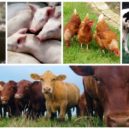SPIRITUAL WELL-BEING FOR LAW ENFORCEMENT

I have battled with spirituality my entire life. I believed there was some divine power. I felt this in my heart, but for a long time my rational mind was at odds with my heart. Although, I am not much of a religious man. I craved, a connection with a greater power. Strangely, somewhere along the way spirituality discovered me by a strange quirk of fate. And today, the journey continues.
 My niece who is trying to discover spirituality, recently asked me how religion differed from spirituality. The answer I gave her never convinced her. I do that again now having chosen to write on the importance of spiritual well being for police personnel. This time around, I hope I make sense.
My niece who is trying to discover spirituality, recently asked me how religion differed from spirituality. The answer I gave her never convinced her. I do that again now having chosen to write on the importance of spiritual well being for police personnel. This time around, I hope I make sense.
I reckon that religion is the belief in a power outside oneself called God, while spirituality is everyone’s intrinsic spiritual nature and power. We all have the divine within ourselves, that embodies itself in our uniqueness our authenticity. Spirituality is an inward voyage rather than some form of external activity. Spirituality, therefore, is much more about inner awareness than outer worship. Religion and spirituality are not synonymous: Police personnel can stick to spiritual tenets following no particular belief.
 Spirituality is also that part of oneself that helps one find meaning, connectedness and purpose in one’s life. It can include the practice of philosophy, religion, or way of living. During tough times, people frequently look for meaning and connectedness in the greater scheme of things to help them comprehend and deal with their experience.
Spirituality is also that part of oneself that helps one find meaning, connectedness and purpose in one’s life. It can include the practice of philosophy, religion, or way of living. During tough times, people frequently look for meaning and connectedness in the greater scheme of things to help them comprehend and deal with their experience.
This is more so in the life of police personnel who in their day-to-day lives get so caught up in catching criminals and protecting lives that they overlook they are spiritual beings. When the police personnel see the worst of society, such as irrational beatings, child abuse, murder, rape, they tend to forget their spiritual selves and their world gets crammed with anguish and hopelessness. The physical world cannot end their despair and hopelessness only the spiritual world can. The oneness; the connection with the essence alone can heal by lending them purpose and reason for being. The why which the spiritual connection furnishes alone can give the wisdom to cope and flourish in this world which is going mad. When police officers unearth who they are inside, they can discover immense peace and solace.
 Besides the physical demands and perils, the police job is hugely demanding spiritually. A career in law enforcement can also take a hefty toll on police personnel’s spiritual well-being. The law enforcement community is yet to address the magnitude of police stress in any meaningful way. Police job inflicts traumas and scars that are spiritual and not physical. Many police officers suffer deep psychological pain because of what they have observed during their duties. Police personnel experience the demise of their spirituality because of the negative aspects of the occupation, as a result, they need counsel, and they need to be furnished tools to tune themselves up regularly.
Besides the physical demands and perils, the police job is hugely demanding spiritually. A career in law enforcement can also take a hefty toll on police personnel’s spiritual well-being. The law enforcement community is yet to address the magnitude of police stress in any meaningful way. Police job inflicts traumas and scars that are spiritual and not physical. Many police officers suffer deep psychological pain because of what they have observed during their duties. Police personnel experience the demise of their spirituality because of the negative aspects of the occupation, as a result, they need counsel, and they need to be furnished tools to tune themselves up regularly.
A lot of research is being conducted on emotional and psychological stressors, and organisations have taken several steps to counteract them like” Police Well-Being” program in Tamilnadu, but no actions seem to have been formulated to preempt spiritual stress. We are just starting to recognise the effects of spiritual stress. The challenge now is to introduce spirituality with no religious underpinnings.
In India, several police officers die in the line of duty every year. Also, police officers take their own lives as they suffer from depression, addictions, divorce, spiritual and psychological ailments at a rate higher than the general community.
 What is even more alarming is the lack of spiritual resources available to battle the spiritual maladies that afflict the officers. Not many resources have been spent on developing strategies to ensure their spiritual well being. Police personnel need guidance and counsel to reflect upon their spiritual condition and know-how to keep it healthy so that they can respond to trials and tribulations in their lives at a higher and nobler moral level. If we commit resources to bolster the spiritual vision and expand them spiritually, they will develop spiritual resilience which will enable them to maintain a sense of reality and balance. We all need to make police personnel aware of their spiritual aspiration and help them reconnect to it to fortify them spiritually and buffer them against all vicissitudes of police subculture.
What is even more alarming is the lack of spiritual resources available to battle the spiritual maladies that afflict the officers. Not many resources have been spent on developing strategies to ensure their spiritual well being. Police personnel need guidance and counsel to reflect upon their spiritual condition and know-how to keep it healthy so that they can respond to trials and tribulations in their lives at a higher and nobler moral level. If we commit resources to bolster the spiritual vision and expand them spiritually, they will develop spiritual resilience which will enable them to maintain a sense of reality and balance. We all need to make police personnel aware of their spiritual aspiration and help them reconnect to it to fortify them spiritually and buffer them against all vicissitudes of police subculture.
 That’s because the police personnel who pursue a vocation in policing do so with rhetorical intentions. There can be no higher spiritual motivation than to protect and serve. The police profession conveys a profound aspiration of a noble human spirit to fulfil a transcendent purpose to attend to the welfare of human beings. What drives people to act and accomplish is the human spirit. What inspires police personnel to join the police force encompasses a yearning to make a positive difference in the world by safeguarding the weak and innocent, by endorsing noble ideals like the sanctity of human life and fighting evil. Many police personnel join the force compelled by such spiritual yearnings, but they are not conscious, once they realize it, spirituality will automatically continue to grow throughout their career. As soon as the recruits enter the police profession, they become distracted by the glamorousness of the uniform and the job. No one ever seems to make them aware of the spiritual rationales of the role that initially brought the recruits into the profession.
That’s because the police personnel who pursue a vocation in policing do so with rhetorical intentions. There can be no higher spiritual motivation than to protect and serve. The police profession conveys a profound aspiration of a noble human spirit to fulfil a transcendent purpose to attend to the welfare of human beings. What drives people to act and accomplish is the human spirit. What inspires police personnel to join the police force encompasses a yearning to make a positive difference in the world by safeguarding the weak and innocent, by endorsing noble ideals like the sanctity of human life and fighting evil. Many police personnel join the force compelled by such spiritual yearnings, but they are not conscious, once they realize it, spirituality will automatically continue to grow throughout their career. As soon as the recruits enter the police profession, they become distracted by the glamorousness of the uniform and the job. No one ever seems to make them aware of the spiritual rationales of the role that initially brought the recruits into the profession.
A policeman joins the profession with innocent idealism, but the hardships, predicaments, and vicious acts can wreck that challenge. Everyday stressors on the job drain officers’ faith and spiritual deposits. The spiritual reservoir of a police officer gets depleted with every brush with evil and suffering a person encounters on the job. Psychologist Carl Jung noticed a weird phenomenon of spiritual people; he found that those who failed to feed their spiritual side by withholding spiritual nourishment that their soul’s desire often experience existential discomfort. If such police personnel can identify their origin of pain, they can untangle it, but if they cannot recognise they indulge in hindering behaviours expecting that the pain will go away. A person with an unfulfilled spiritual aspiration can wreak havoc when dealing with the pain because the effort to improve it can prove disastrous as the efforts to ease it often enhance it. Many during the process of deadening their pain take to self-destructive addictive behaviours. Recruits enter law enforcement callings yearning to give expression, to nurture, to ‘cultivate, and rehearse their spiritual side, which needs regular, sustained replenishment for health. If they receive that sustenance, officers often become more profound human beings and attain a level of mature idealism. But if they do not accept that nourishment, and don’t realise they are spiritual beings and if they don’t know that they need help on that plane, they probably will end up disheartened, disturbed, depressed, or sad.
Therefore, police personnel need spiritual coaching. Spiritual coaching can enable police personnel to unleash the divine within them, permitting replenishing of their inner power, helping them become conscious architects of their own lives. Unleashing the divine within them results in better health, happier relationships and more compassion. Helping the police reconnect can cause moving experiences resulting in awakening to the presence of the inner spirit. Which can uncover the spirit within each of them holding forth the promise of eternal life and quicken the realisation that we are all one.
Hence, infusing spirituality in police personnel has many benefits. Spirituality will make the police personnel gracious. Spirituality will encourage the police to be positive, which will get expressed as gratitude, optimism and generosity.
Spirituality will make police personnel compassionate. Showing compassion towards others is one correlate with living a spiritual life. Spirituality allows one to feel good about the little things in life and look at the world through empathetic eyes. Spiritual people have positive relationships, high self-esteem, are optimistic, and have meaning and purpose in life. When police personnel turn spiritual, they begin to self actualise and start considering personal growth and fulfilment as the main goal as it compels them to focus on internal values and work on becoming a better individual. Spirituality will help police personnel to cease dwelling on dark experiences and start taking time to savour life experiences and build lasting memories of positive experiences correlated with smaller pleasures in life.
Spirituality in a way also connects with neuroscience; when our conditioned brains release the old limiting beliefs which have wired our brain to mediocrity, we can nullify the wiring as our minds are plastic and return to our original divinity.
We are aware that a policeman’s life is filled with more stress than an ordinary man; a policeman is more liable to punishment rolls, suspension, job loss and anxieties of daily life which can prove debilitating. Practising spirituality can be a productive way to curtail stress levels and direct one’s energy on something positive.
Studies have shown that meditation and mindfulness yield positive outcomes for the overwrought policeman. Finding a calm spot and reflecting for a few moments, forfeiting control of whatever is tormenting may be just enough to quiet an employee down. Depression is widespread among many law enforcement personnel studies indicate that spiritual practices such as mindfulness and meditation can alleviate the effects of the spiritual stress. Research shows that spirituality is also associated with better health outcomes. Spirituality appears to help people cope with disease, suffering and death. All people, with or without a connection to organized religion or any spiritual practices, appear to benefit from discovering their own sense of meaning, purpose and connectedness..
Eventually, therefore, the Spiritual well-being is almost as crucial as physical and emotional health in police organisations. If police organisations can effectively address the spiritual, as well as the physical and emotional needs of employees, they will be able to lend them the tools to find harmony in their personal and professional lives. Research has demonstrated that spiritually healthy persons experience less stress, avoid negative behaviours, and have more commitment to their duties and responsibilities.
Source from: epaper/deccanchronicle/chennai/dt:23.12.2019
 Dr.K. Jayanth Murali is an IPS Officer belonging to 1991 batch. He is borne on Tamil Nadu cadre. He lives with his family in Chennai, India. He is currently serving the Government of Tamil Nadu as Additional Director General of Police, Law and Order.
Dr.K. Jayanth Murali is an IPS Officer belonging to 1991 batch. He is borne on Tamil Nadu cadre. He lives with his family in Chennai, India. He is currently serving the Government of Tamil Nadu as Additional Director General of Police, Law and Order.



Dec 26, 2019 at 5:51 AM /
Good morning, Sir,
Yes, Sir. It’s TRUE that Spiritual Well-being, is crucial as Physical & Emotional Health. It’s also TRUE, for MILITARY SERVICES.
One’s HAPPINESS can be defined as the Ratio of the ACHIEVEMENTS, achieved, by the Individual, to the SELF-EXPECTATIONS, which depends on the Personal Qualities & Life-Skills, ENVIRONMENT and Society’s Cultural Values.
Thanks for the Great Article.